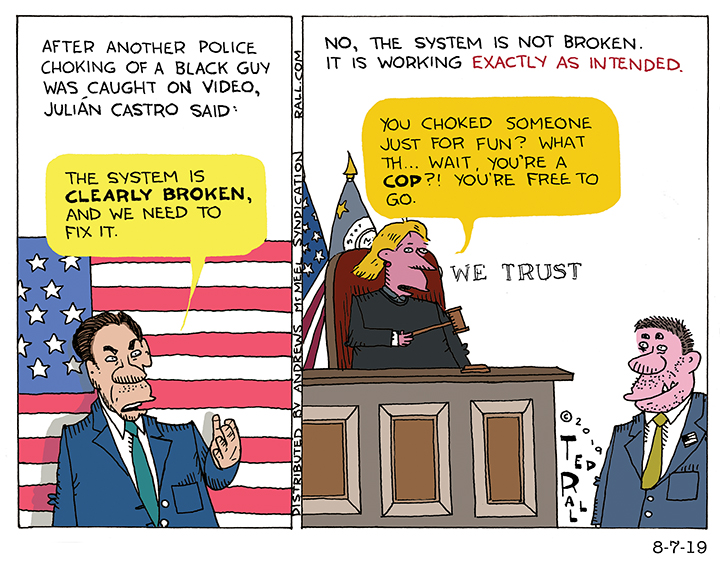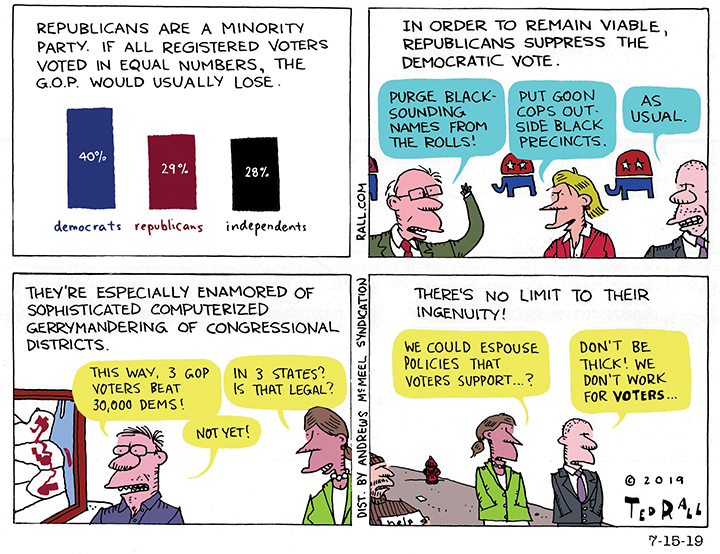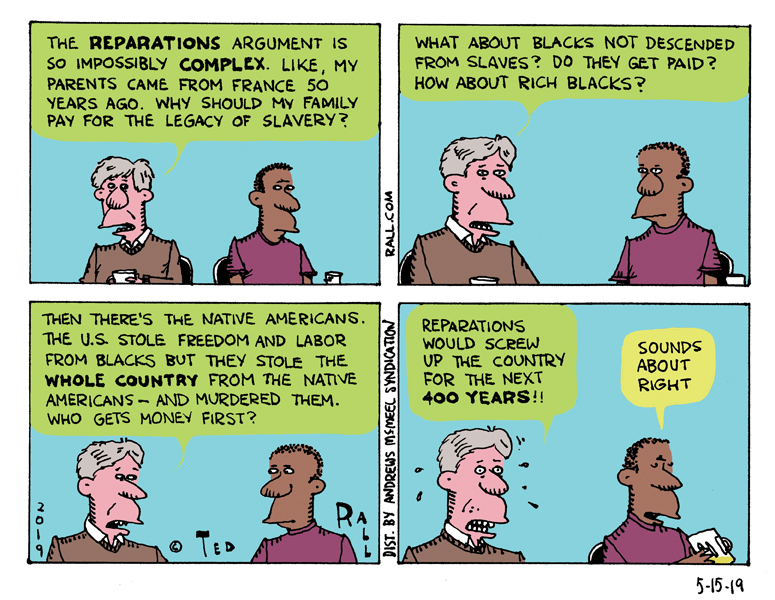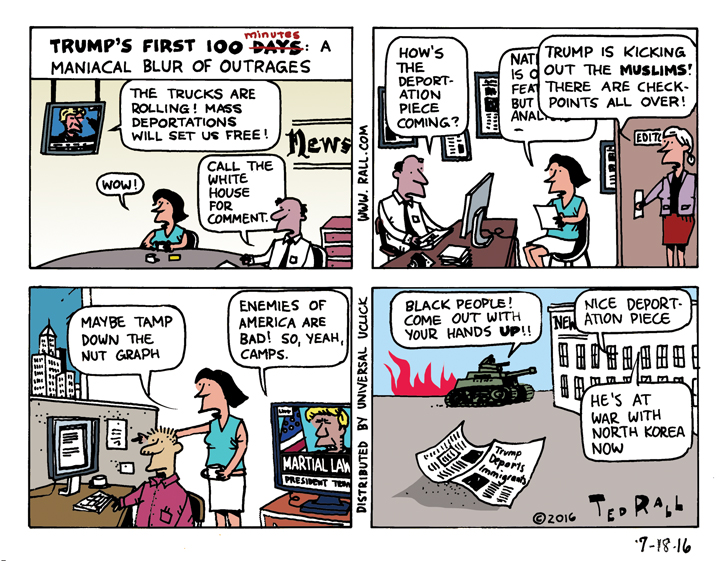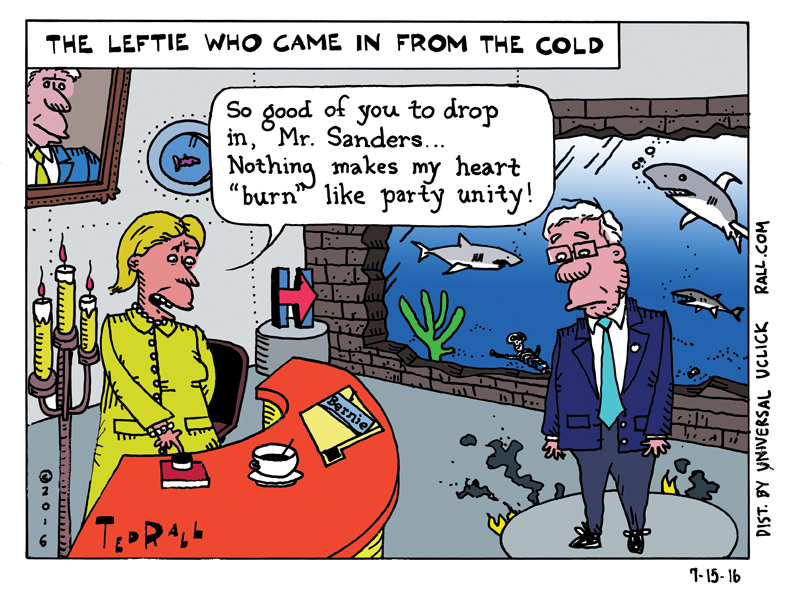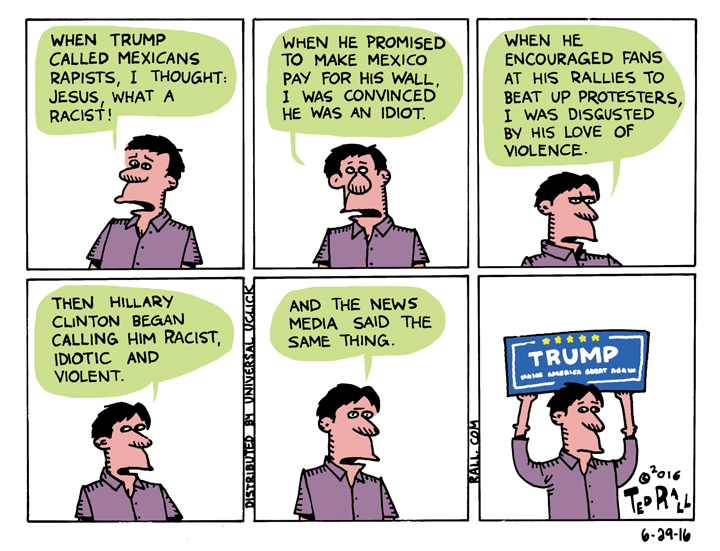To his credit, presidential candidate Julian Castro retweeted an image of yet another black man being choked by an aggressive white police officer. Not so much to his credit he failed to grasp that the problem is systemic.
SYNDICATED COLUMN: Remember When? The Border Wall Used to be a Left-Wing Thing
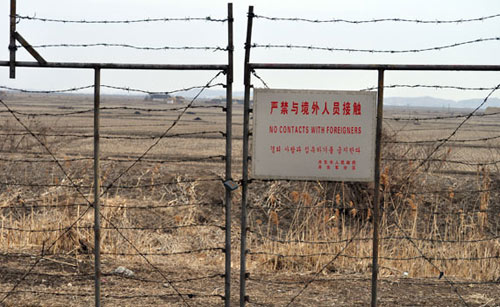
Illegal immigrants, President Trump claims, are pouring over the border from Mexico into the United States. That’s not true now; notwithstanding the ballyhooed caravan of Central American migrants who recently arrived at a California crossing, illegal crossings are hitting historic lows. There’s actually a net outflow. But it was true until the early 2000s — which is when the left was calling for a border wall.
“Legal immigration should become safe, legal and commonplace,” I wrote in 2005 in response to George W. Bush’s call for a guest worker program for illegals. I opposed Bush’s plan because it would hurt American wages and job prospects. “At the same time, no nation worthy of the name can tolerate porous borders. We can and must seal our borders to prevent economic migrants, terrorists and others with unknown motives from entering the United States.”
It seems strange to recall, but support for stronger border controls was a common thread among both the populists of the America-First Pat Buchanan right and the labor-protectionist left that backed Bernie Sanders. Now the right, led by Mr. Trump, monopolizes the cause of economic nationalism — but recent history shows that there’s a even stronger, non-xenophobic for protectionism on the left. The problem is, Trump and Congressional Republicans haven’t been willing to make concessions to get The Wall (or a cheaper high-tech alternative to bricks, mortar and corrugated fencing with negative environmental impacts).
For their part, Dems have adopted a policy stance that thoughtful leftists recognize as nonsensical and ideologically incoherent.
First, mainline Democrats have been arguing, we should look the other way as foreigners enter the country unchecked because we need undocumented workers to take low-wage occupations — picking fruit, plucking chickens, making our hotel beds — that Americans don’t want. But that’s not only is not true, it cannot be true. Without undocumented workers, employers would be forced to offer higher wages for those tasks they couldn’t automate. Inflationary risks and agriculture sector disruption notwithstanding, raising wages for unskilled labor would create upward pressure on wages up the salary chain. Simple supply and demand. The removal of 11 million consumers, however, would depress spending on goods and services as well as sales tax collections.
The other pillar of Democratic immigration policy is so absurd that the party rightly refuses to articulate it: that border controls are inherently racist and xenophobic. No other country thinks so. You can’t sneak into Uruguay or Tanzania or the Seychelles without a visa (much less look for work) and hope for anything other than arrest and deportation. Controlling the flow of human beings into one’s country isn’t bigotry. It’s one of the fundamental characteristics of a modern nation state. One could sooner do without minting one’s own currency or issuing postage stamps.
Yet the status quo, a tacit open door at various crossing points, is all Democrats have to offer: more of the same lunacy.
The only reason the Democrats get away with their sophistry is that Trump’s comments about illegal immigrants during the campaign (Mexican rapists, etc.) were so vicious and toxic. On immigration, he out-crazied the Democrats. In power, the Trump Administration’s aggressive enforcement of immigration laws has come across as gratuitously cruel.
Trump’s ban against visits to the U.S. by citizens of six Muslim nations said to be associated with terrorism was launched so haphazardly that families with visas and/or official refugee status were turned away at JFK airport after boarding planes in their home countries with legitimate documents. Refugees from Syria, where a civil war rages in part because one side was funded and armed by the U.S., have almost all been refused entry although most Syrians fleeing the war zone are doing so precisely because they are enemies of ISIS and other radical Islamist groups out to attack American interests.
News reports have showcased sobbing families watching relatives who came here illegally from Latin America but have lived exemplary, law-abiding (except for their immigration status) lives as entrepreneurs and parents, being sent to countries like Honduras where they fear for their lives. Trump threw the “Dreamers” — kids without criminal records who came to the U.S. essentially as luggage, with their parents — under the bus. Americans support borders, but not these kinds of deportations — and thus not this Wall.
You may have been born here. But there’s a good chance that someone in your family tree arrived at Ellis Island or somewhere else without their paperwork in perfect order.
Like any other country, the United States ought to vet everyone who seeks to enter its territory. We need less illegal immigration and more legal immigration. As we reduce unauthorized land crossings and overstayed visas, we ought to increase opportunities for foreigners to apply for legal visas with a clear path to a green card and citizenship. Unlike undocumented workers preyed upon by rapacious employers because they live in the shadows, legal immigrants can insist upon fair legal wages. Admitting them puts less downward pressure on wages.
We need a realistic approach to the estimated 11 million illegal immigrants currently here. So what if we wind up “rewarding” people who technically broke the law? We left the border open, we hired them, we chose not to enforce our own laws. This is what happens when a rich country leaves open its border with a poor one. Those who committed serious felonies (far fewer than three percent) should be carefully evaluated to see if they are likely to reoffend after serving their prison sentences; those determined not to have been rehabilitated should be deported to their countries of origin.
The others should receive amnesty. Most of the beneficiaries of Ronald Reagan’s 1986 mass amnesty worked out fine.
Immigration hardliners worry that each amnesty is a precedent for the next one, but that will only be true this time if we again fail to secure the border.
If Republicans keep the House next year, Trump will get his wall — or groundbreaking on one before a future Democratic regime halts construction. With that outcome less than certain (to say the least), Trump could secure the assent of the progressive populist base of the Democratic Party if he were to throw in legalization of the straight-and-narrow illegal immigrants who are already here along with an end to his Muslim ban.
Republicans could point to a promise kept on border protection. Democrats could throw a bone to a restive base on economic nationalism without climbing in bed with Trumpian xenophobia.
A win-win. Almost like Washington in the old days.
Never happen.
(Ted Rall (Twitter: @tedrall), the editorial cartoonist and columnist, is the author of “Francis: The People’s Pope.” You can support Ted’s hard-hitting political cartoons and columns and see his work first by sponsoring his work on Patreon.)
SYNDICATED COLUMN: So What if President Trump is an Asshole? All the Presidents Have Been Assholes.
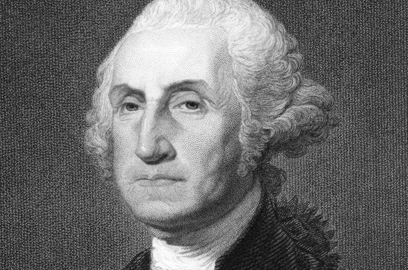
President Trump is under fire and we’re all shocked shocked SHOCKED that his shithole mouth called the (predominantly black) nations of Africa “shitholes,” helpfully comparing them to (predominantly blonde) Norway to make sure nobody missed the point. To drive home just how pissed off people are about this (and rightly so), Trump’s shithole comment overshadowed news that the government accidentally told the citizens of Hawaii they were about to get nuked. As George W. Bush would say, that’s some weird shit.
This is a big deal unless you’re reading this more than a few days after this writing, at which point Trump will have raised more hell with some new idiotic utterance that makes us forget about this one.
Speaking of hell-raising: I managed to raise a few social-media hackles recently when I posted the following: “I honestly don’t understand why people are so depressed about Trump. Policy-wise, he isn’t much different than Obama. Trump is truth in advertising: he is an asshole, our country acts like an asshole. No need for phony smiles, PC rhetoric.”
This led to a discussion comparing Trump not just to Obama, but other American presidents. There were lots of great comments. Still, I was struck by something that few people seem to be aware of — America’s rich history of presidential assholery. Given how wicked smart my readers are, I was surprised to hear some of them refer favorably to Trump’s predecessors.
Trump is a thieving, lying turd. In that respect, he is as presidential as it gets. Going back to Day One, the United States has been led by white males behaving badly.
Trump gets attacked for using the presidency to line his pockets, and rightfully so. Yet The Donald has nothing on the Father of Our Country.
George Washington was worth more than half a billion in today’s dollars — riches he accumulated in large part by exploiting his political influence to loot federal coffers. He joined the Masons, married well, scored a few lucky inheritances and invested the loot in real estate along what was then the Colonies’ western frontier in Indian territory that he came across as a young land surveyor.
GW’s acreage was on the wrong side of the Appalachian mountains — but not for long. Talk about conflict of interest: as commander of the revolutionary army and president, he promoted settlement of the west by whites that pumped up the value of his early investments. The fact that those whites were engaged in genocide bothered Washington not one whit.
Even on the Left, some Americans point to Lincoln as a pillar of moral rectitude. But Honest Abe suspended the ancient writ of habeas corpus; in 2006, a militaristic asshole named George W. Bush relied on Lincoln’s 1863 precedent to abolish it altogether.
Since nothing in the Constitution bans secession, Southern states enjoyed the legal right to leave the Union. Defying the Constitution, Lincoln went to war — illegally — to bring them back. Not only was the Civil War a bloodbath, it left us with a nation that remains politically and culturally fractured to this day. Blacks were 13% of the population of the Confederacy. Had Lincoln chosen peace, a slave uprising might have brought down the Old South — and killed a lot of racists.
Lincoln cheated in the 1864 election by playing both sides of the secession. To justify the war, he claimed the breakaway states were still part of the Union, yet didn’t count Southern electoral votes because they would have cost him reelection.
You name the president, I’ll name at least one unforgiveable sin.
FDR? The New Deal was a grand achievement. But if trying to stack the Supreme Court isn’t impeachable, what is? When World War II broke out, Roosevelt played footsie with Vichy France while snubbing the Resistance. He turned away Jewish refugees and refused to bomb the Nazi infrastructure used to murder Jews. He dragged his feet taking on Hitler so that the Soviet Union would take the brunt of Nazi savagery.
Folks are already saying: “Barack Obama will be inducted into the league of Great Presidents.” Obama, most Democrats have already forgotten, broke his promise to try for a “public option” in the Affordable Care Act. He went on languid vacations while the global economy was collapsing, handed trillions to bankers no strings attached and did nothing to help the unemployed and people whose homes were stolen by the banks. And he slaughtered thousands of innocent civilians with drones — people who represented zero threat to anyone — just for fun.
If that’s a great president, give me a shitty one.
(Ted Rall (Twitter: @tedrall) is co-author, with Harmon Leon, of “Meet the Deplorables: Infiltrating Trump America,” an inside look at the American far right, out now. You can support Ted’s hard-hitting political cartoons and columns and see his work first by sponsoring his work on Patreon.)
Trump’s Maniacal First 100 Days
Trump’s political genius is centered around his manic style. He issues one outrageous statement after another, so that the media and critics can only begin to respond to each before it gets eclipsed by the next one, with the net effect that nothing ever gets fully processed. If elected president, he’ll probably do the same thing. Hey, it worked for George W. Bush!
SYNDICATED COLUMN: Cops Shouldn’t Write Tickets – How to Fix the Broken Relationship Between the People and the Police

After years of no one – at least not the white people who control the media – giving a damn about what happens to black people at the hands of white cops, suddenly the terrible relationship between people and the police is a huge problem.
This is what happens when the power dynamic gets reversed, when aggressors find themselves in the unhappy role of victims. First, five policemen were assassinated in Dallas, as payback for police violence in general. Now three more have been killed in Baton Rouge, apparently to retaliate for the murder of another unarmed black man, Alton Sterling, by local police.
Cops are getting shot. So the media is finally paying attention.
Airing the issue is long overdue, but as usual it’s playing out in hackneyed catchphrases that are unlikely to lead to meaningful improvement.
What we need, liberal wise men of the media tell us, is more community policing. Cops and the community need to get to know each other. Cops should get out of the squad car, walk around, talk to the locals before they shoot them.
Conservatives have a different answer: they think people, especially black people, need to have more appreciation for the extremely hard job the police are asked to do. Except that being a cop isn’t really that hard or that dangerous. You are far more likely to die on the job if you are a logger, a pilot, a steelworker, a garbageman, a construction labor, a farmer, or president of the United States. The reason so many people join the police is that it’s actually a sweet gig: pretty well paid (especially with overtime), and you get to retire after 20 years.
Fixing people’s terrible relationship with the police who are paid to protect and serve them will require radical rather than incremental change.
(Notice that I said “people,” not “minorities.” The racial dynamic between police and minority neighborhoods that they patrol like occupied enemy territory in a war zone captures the headlines, but not the reality of a country in which many people, not just blacks, view the police with a mixture of fear and contempt. 41% of whites, for example, don’t have a high degree of confidence in the police or view them as being honest.)
Three major structural changes would go a long way towards fixing the problem.
First, the police should stop carrying guns.
In many countries, including countries where citizens have the right to bear arms, the police generally don’t carry a weapon on duty. Places like Norway, Iceland, Japan, New Zealand, Britain, and Ireland haven’t disintegrated into anarchy as a result. Nor have many policemen lost their lives. There are, of course, many reasons why disarming the police works, but there’s one that jumps to mind right away: when you get pulled over by a cop here, you know that the only way you’re going to get away clean is by shooting the police officer. Traffic stops often turn deadly. Taking guns away from the police reduces the stakes in confrontations between law enforcement and suspects. It makes everyone, including the police, safer.
If someone is robbing a bank, there’s the option of picking up some guns at the police station and waiting outside. That’s what they do in Britain.
Second, cops shouldn’t be writing tickets.
As school children, we learned that Officer Friendly is here to help us in the event that we run into trouble. In other words, the police are our guardians. But how do you reconcile that image with getting pulled over for a minor traffic infraction like a broken taillight?
If the police were really here to help us, if they were here to protect us, the policeman who tells you about your broken taillight wouldn’t write you a ticket. He certainly wouldn’t use that traffic stop as an excuse to search your vehicle for drugs or other contraband, much less steal it through “asset forfeiture.” He would tell you about the problem so that you could fix it. Period.
For the vast majority of Americans, the typical interaction with law-enforcement – indeed, their typical interaction with their government – is a police officer issuing them a parking or a traffic ticket. The role of government shakedown thug/municipal revenue enhancement is incompatible with the role of a guardian. A guardian wants you to drive safely. He doesn’t sit cleverly behind a tree at the bottom of a steep hill, where the last speed limit sign was hard to see, in order to extract a few hundred bucks from your wallet. Ask a kid who wants to be a police officer one day whether she wants to catch bad guys or write tickets. You know the answer.
At bare minimum, municipalities should create separate agencies for parking and traffic enforcement. It would be better, of course, if traffic safety had nothing to do with fines. Raise taxes on the rich if you want to replace the billions of dollars collected annually from tickets.
Third, we need a federal agency to appoint independent federal prosecutors to replace the current system of local district attorneys.
When the police are charged with wrongdoing against civilians, the odds are that they will get away with it. In fact, the odds are that they will never face an indictment. In 2015, 85% of police shootings were handled by DAs who work closely with the officer’s own department.
Which isn’t surprising considering the fact that the DA who decides whether or not charges get filed has to have a high conviction rate in order to get reelected or reappointed, which requires him or her to have a friendly relationship with law-enforcement. It’s a ridiculously brazen conflict of interest that ought to have been done away with a long time ago.
(Ted Rall is the author of “Bernie,” a biography written with the cooperation of Democratic presidential candidate Bernie Sanders. His next book, the graphic biography “Trump,” comes out July 26th and is now available for pre-order.)
The Leftie Who Came In From The Cold
After a hard-fought primary campaign, Bernie Sanders capitulated and endorsed his rival Hillary Clinton for the presidency. In the final analysis, Clinton gave up little more than lip service to Bernie’s agenda of a $15 minimum wage, free college tuition at public universities, and universal healthcare. To the contrary, Clinton is now moving to the right, considering a general as vice president and asking the platform committee not to oppose the TPP free trade agreement.
SYNDICATED COLUMN: Violent, Racist Cops Protect a Violent, Racist System
 Racism is complicated. When America’s most brilliant thinkers set out to explain its nature in terms as clear as the English language allows, as Michael Eric Dyson did in his searing July 7th essay “Death in Black and White,” even the relatively sophisticated readers of the New York Times didn’t get it. Commenters didn’t understand that Dyson wasn’t criticizing every white person, but “white America” — shorthand for a dominant power structure that is fundamentally racist while (of course) not every white person is.
Racism is complicated. When America’s most brilliant thinkers set out to explain its nature in terms as clear as the English language allows, as Michael Eric Dyson did in his searing July 7th essay “Death in Black and White,” even the relatively sophisticated readers of the New York Times didn’t get it. Commenters didn’t understand that Dyson wasn’t criticizing every white person, but “white America” — shorthand for a dominant power structure that is fundamentally racist while (of course) not every white person is.
If anti-racist white people take writing as straightforward as Dyson’s personally, if they take offense at his passion and so miss his message, is there any hope of “black America” and “white America” just getting along?
It’s been a hell of a week. Two more black men, Alton Sterling and Philando Castile, were gunned down by the police under the usual incomprehensible circumstances — events the media, and thus the government, are paying attention to only because someone invented the smartphone. Then a 25-year-old sniper, a veteran of America’s brutal war against Afghanistan, shot 12 police officers at a march in Dallas protesting the deaths in Minnesota and Louisiana. Five died.
Needless to say, the Dallas cops didn’t have it coming. They didn’t have anything to do with what happened in entirely different states.
Well, it shouldn’t need to be said. But it does. Because, no matter how many times we hear public officials tell us that the police protect and serve us, it doesn’t ring true. Three out of four African-Americans tell pollsters they don’t think police are held accountable for their actions. So do 40% of whites.
The truth is, Americans don’t like cops.
Let’s be honest. If we think about them at all, we don’t mourn the slain Dallas police officers as deeply as we did the children who died in the day care center blown up in Oklahoma City, or the nightclubbers murdered in Orlando.
We need to talk about why that is.
We have been hearing more about racial profiling, how blacks are targeted by police officers more than whites, how they are physically assaulted more often, how they are charged with more serious crimes for the same offenses, how they get longer prison sentences and harsher fines. Good. This discussion is long overdue. Way too many people still don’t get it.
It is right and proper to focus on Black Lives Matter. To say it. To believe it. A retort that All Lives Matter is far worse than pabulum. Because it distracts from a point that still hasn’t received proper consideration in the media or in electoral politics, All Lives Matter is racist. Even the first black president has addressed the racism behind police violence only in “it sure is sad, we should do better” niceties rather than meaningful, sweeping policy changes. (He could start with blanket presidential pardons of black inmates serving ridiculously long prison sentences.) Black Lives Matter. That’s what we need to talk about now. For a good long time, too.
One possible place to start is the reaction of many people to the Dallas sniper attack. Like 9/11, it was shocking. Like 9/11, it also wasn’t surprising. You can’t go on acting like a bully forever. The powers that be can’t pressure their victims forever. Eventually the prey strike back. No, it isn’t justified. Nor is it right. But it is chickens coming home to roost.
Like the Bush Administration after 9/11 (“Why? Why do they hate us?”), the police and the political elites the police actually protects and serves look silly when they pretend that they can’t possibly imagine why anyone might dislike them. “There is no possible justification for these kinds of attacks or any violence against law enforcement,” President Obama said after Dallas. No justification? Sure.
No possible justification? Before they blew him up with a robot bomb in an extrajudicial assassination (there weren’t any hostages), suspect Micah Johnson told police negotiators that he was “upset about the recent police shootings…[that] he wanted to kill white people, especially white officers.” You’d have to be especially thick, or really really white, not to see why a black guy might snap after watching the Alton Sterling and Philando Castile snuff videos.
Obama continued: “Anyone involved in the senseless murders will be held fully accountable. Justice will be done.” Naturally, Obama was referring only to justice for the murdered police officers. There’s never any justice for those murdered by police officers (c.f., Freddie Gray, Michael Brown, Walter Scott, Eric Garner, etc.).
There’s a lot to worry about in all this. As for me, I’m concerned that the true nature of the police, the roots of its brutality in its role as the armed guards of the ruling classes, has been obscured by the racial divide. Racism is real. It’s complicated.
So is class warfare.
Even if you are privileged as I am – white, male, able-bodied, Ivy League-educated – odds are that your interactions, like mine, with the police are generally unpleasant. Mostly, I run into them when they pull me over to give me a ticket. If I’m lucky, they are merely rude, overbearing, aggressive and condescending. Once in a blue moon, a cop manages to be merely gruff. And I’m lucky. I’ve seen the way cops act in black neighborhoods. It’s much, much worse. They’re disgusting.
I had a bad experience with a Los Angeles police officer in 2001. He arrested me for jaywalking — falsely. He roughed me up and handcuffed me. This being America, I couldn’t help wonder whether he might have targeted me because he was black and I was white. But he never said anything that indicated that. Maybe he had a quota to fill.
Black or white, the police are paid to oppress, not protect. Black or white, citizens have good cause to be afraid of them. That’s the nature of the system. It’s another reason the system has got to go.
(Ted Rall is the author of “Bernie,” a biography written with the cooperation of Democratic presidential candidate Bernie Sanders. His next book, the graphic biography “Trump,” comes out July 19th and is now available for pre-order.)

